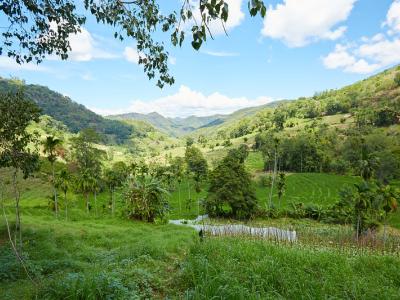
Photo:
São Tomé and Príncipe is the second smallest country in Africa and is a Small Island Developing State. The country faces significant challenges in the face of climate change including land degradation caused by commercial logging, unsustainable agriculture and competing demands for food, energy, and space, and increasing ocean acidification, coastal floods, and marine degradation. In 2021, the country revised and updated its nationally determined contribution (NDC), which doubles the targets initially outlined in their 2015 NDC.
The NDC identified the most vulnerable sectors as agriculture, fisheries, and livestock. Horticultural and vegetable production are highly exposed to extreme weather events, such as floods, droughts, and heavy rains. These crops are drastically affected by pests, requiring substantial agricultural inputs and agrochemicals, which increases land-based waste that ends up in groundwater layers and the sea. These practices are affecting the Blue Economy resource base. São Tomé and Príncipe’s main commodities and exported crops are cocoa, coffee, copra, palm oil, coconut oil and pepper, which are also affected by climate change.
- National Governments
- United Nations Development Programme (UNDP)
- Food and Agriculture Organization of the United Nations (FAO)
- Ministry of Infrastructure and Natural Resources, Government of Sao Tome and Principe
The country approved a Blue Economy Transition Strategy in 2019 to preserve biodiversity, coastal and marine ecosystems, and is currently preparing a national investment plan committing to substantially reduce agrochemicals by 2030 in its updated NDC and Voluntary Land Degradation Neutrality targets.
In 2021, a GEF-funded Supporting Sustainable Inclusive Blue Economy Transformation in Atlantic and Indian Ocean (AIO) Small Island Developing States (SIDS) programme was approved and aims to support the development of sustainable blue economies through improved governance, national Blue Economy demonstrations, and knowledge management. UNDP will be the GEF Implementing Agency and UNOPS the Executing Agency of this project. The project is linked to the national goal of reducing the use of pesticides and chemical fertilizers by 25 percent and increasing the use of organic products by 25 percent by 2030.
In July 2022, the Government of São Tomé and Príncipe expressed their interest in receiving support from the SCALA programme, which supports countries in building adaptive capacity and reducing greenhouse gas emissions to meet targets set out in their National Adaptation Plans (NAPs) and NDCs.
One of the priority areas in São Tomé and Príncipe’s updated NDC and one of the five voluntary Land Degradation Neutrality (LDN) targets are to reduce the use of pesticides and chemical fertilizers by 25 percent and increase the use of organic products by 25 percent by year 2030. To attain this objective, and to strategically contribute to GEF’s Regional Blue Economy Transformation program, São Tomé and Príncipe requested assistance to promote the sustainable use of fertilizers, pesticides, and other phytochemicals by supporting the development of an ecosystem of organic bio-input manufacturers to produce organic vegetables and other commodities and increase market access opportunities for organic vegetables.
The technical assistance from the SCALA Private Sector Engagement (PSE) Facility Program will be delivered in close collaboration with the UNDP São Tomé and Príncipe Country Office, the SCALA Global PSE Team, FAO, and other partners to assist the government in the collection of data and gain insight on potential market opportunities, drawing from existing climate-related studies and analysis. In 2023, the market study report, 'Enhancing the bioinputs and organic vegetables value chains in São Tomé and Príncipe' was delivered.
Scope of work
Development of market studies:
- Assess and research the commercial viability of bio inputs to produce organic vegetables and commodities for export;
- Assess the market viability of organic vegetables in the domestic market.
Activities:
- Preparation of market studies
- Validation workshops with key stakeholders
- Strategic report and recommendations





